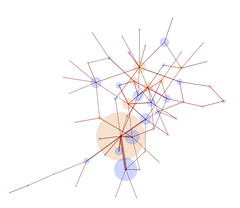September 29, 2010
How to write a science newspaper story
 This is a news website article about a scientific finding by Martin Robbins is a great sendup of the typical online article about a scientific finding.
This is a news website article about a scientific finding by Martin Robbins is a great sendup of the typical online article about a scientific finding.
I especially liked him bringing up one of my pet annoyances:
In this paragraph I will state in which journal the research will be published. I won't provide a link because either a) the concept of adding links to web pages is alien to the editors, b) I can't be bothered, or c) the journal inexplicably set the embargo on the press release to expire before the paper was actually published.
In the case of biotechnology or medicine, the article would traditionally end with a bioethicist saying with gravitas that this research raises important ethical issues. And if I were referenced somewhere I would most likely say people have a right to enhance whatever it is we are talking about.
September 28, 2010
Uploading by Gmail
 Giulio Prisco gives Google permission to upload him based on the data in his Gmail account.
Giulio Prisco gives Google permission to upload him based on the data in his Gmail account.
Of course, most content of that account is not information about Giulio's mental state but the mental states of others, so the process becomes much better the more people allow future Google to do this.
Humor aside, I would really like to develop a good argument about when reconstructing a mind from its inputs and outputs is possible. Being a slice-and-dice favoring WBE thinker, I am suspicious of the feasibility. But am I wrong?
It is not too hard to construct "minds" that cannot be reconstructed easily from outputs. Consider a cryptographically secure pseudorandom number generator: watching the first k bits will not allow you to predict the k+1 bit with more than 50% probability, until you have run through the complete statespace (requires up to ~2^(number of state bits) output bits). This "mind" is not reconstructible from its output in any useful way.
However, this cryptographic analogy also suggests that some cryptographic approaches might be relevant. Browsing a paper like Cryptanalytic Attacks on Pseudorandom Number Generators by Kelsey, Schneier, Wagner and Hall (PDF) shows a few possibilities: input-based attacks would involve sending various inputs to the mind, and cryptoanalyzing the outputs. State compromise extension attacks make use of partially known states (maybe we have some partial brainscans). But it also describes ways the attacks might be made harder, and many of these seem to apply to minds: outputs are hashed (there are nontrivial transformations between the mindstate and the observable behavior), inputs are combined with a timestamp (there might be timekeeping or awareness that makes the same experience experienced twice feel different), occasionally generate new starting state (brain states might change due to random factors such as neuron misfiring, metabolism or death, sleep and comas, local brain temperature, head motion, cell growth etc). While the analogy is limited (PRNGs are very discrete systems where the update rule is simple rather than messy, more or less continuous systems with complex update rules - much harder to neatly cryptoanalyze) I think these caveats do carry over.
But this is not a conclusive argument. Some minds are likely nonreconstructible (imagine the "mind" that just stores a list of its future actions is another example: it can be reconstructed up until the point where the data runs out, and then becomes completely opaque), but other minds are likely trivially reconstructible (like the "mind" that just outputs 1 at every opportunity). A better kind of argument is to what extent our behavioural output constrains possible brain states. I think the answer is hidden in the theory of figuring out hidden Markov models.
September 24, 2010
Bobby Tables lives in Söndrum
 Did Little Bobby Tables migrate to Sweden? - a cute attempt to hack the Swedish election by handwriting a SQL injection or a javascript. Looks more like a "just for the hell of it"-attempt than any serious hack attack (a serious attempt would have to dare the computers run by the tax agency - presumably a very tough target).
Did Little Bobby Tables migrate to Sweden? - a cute attempt to hack the Swedish election by handwriting a SQL injection or a javascript. Looks more like a "just for the hell of it"-attempt than any serious hack attack (a serious attempt would have to dare the computers run by the tax agency - presumably a very tough target).
In a world where anybody and anything could be an attack it is pretty important to sanitize inputs. Having humans acting as firewalls like in the Swedish election is actually pretty safe. As long as the vote counters do not input quotation marks perfectly into the database (or it sanitizes them anyway) things are safe. It is fun to note that the explanation from the election agency why this attack couldn't work isn't true (although the error might of course be due to the filtering through an attempt of popular computer science and the further interpretation/explanation by the journalist): there is a link between what is written on the vote and what is done in the computer (the text), it is just that the translation likely renders any executable non-executable.
This kind of hacking is probably the only kind of hacking where anonymity of the hackers is guaranteed by law.
September 17, 2010
Apples and oranges
 The fact that the concept apples and oranges has a wikipedia page is at first glance amusing. But comparing apples and oranges does have a pretty big literature. I noticed it because I was looking up references in this field for a serious publication (honest!)
The fact that the concept apples and oranges has a wikipedia page is at first glance amusing. But comparing apples and oranges does have a pretty big literature. I noticed it because I was looking up references in this field for a serious publication (honest!)
The classic is Scott Sandford, “Apples and oranges – a comparison”, Annals of Improbable Research, vol. 1: 3, 1995. This one contains a comparison of their spectra, clearly showing they can be compared.
James E Barone, “Comparing apples and oranges: a randomised prospective study”, British Medical Journal, 321:1569, December 2000, which (besides doing comparisions) found an increasing number of literature citations and pointed out that, given the similarities, it would be better to say “Let's not compare walnuts with elephants” or “Let's not compare tumour necrosis factor with linguini.” rather thank "Let's not compare apples and oranges."
This appears to be a pretty well cited article. Including letters to the editor pointing out Sandford's paper. It was cited by Zsuzsa Kaldy, Erik Blaser, How to Compare Apples and Oranges: Infants' Object Identification Tested With Equally Salient Shape, Luminance and Color Changes, Infancy. 2009 March; 14(2): 222–243. which demonstrates that infants probably could compare apples and oranges. Or at least see the difference.
Generally, there has been a lot of criticism of the idiom along the same lines as above: the objects should be more incompatible. Rabbi Johnathon Kroll suggests "milk and roller coasters", Alon Krausz, suggests "milk and running" or "milk and the fourth dimension", Eugene Volkh suggested "apples and democracy" or "oranges and the multiplication table", while someone [citation needed] suggests "to compare research and 39".
Of course, to make things truly incomensurable it has to be something like "apples and ![]() ".
".
September 08, 2010
Gettier got me
 I actually encountered the Gettier problem in real life last week. Knowledge as justified true belief is usually defined as
I actually encountered the Gettier problem in real life last week. Knowledge as justified true belief is usually defined as
"Subject S knows that a proposition P is true if, and only if:
1) P is true.
2) S believes that P is true.
3) S is justified in believing that P is true."
Gettier demonstrated a few counterexamples where people fulfil these three conditions but cannot be said to know something.
I went on a visit to Sweden in order to help a dear friend who had surgery.
1) Indeed he needed help.
2) I believed that he needed help.
3) I had evidence for this (he had his appendix removed).
Except that it turned out that the appendix removal was very easy and I didn't need to help him after that at all... until he suddenly came down with gallstones (the real cause of the symptoms that led to the appendix surgery - his doctors had failed at condition 1) and I had to help him.
It feels rather amusing to actually have encountered a situation that I when I first read about the Gettier problem regarded as a contrived and irrelevant thought experiment. As long as I find myself in epistemic thought experiments I think I will be OK, it is when you get to the ethical thought experiments things get deadly and weird.
Sharing the data
 Data Dependent Journalism - Open Data on Vimeo. A video from Jonathan Marks interviewing some of us from LIFT10. I'm in there, talking about crowdsourcing and the wisdom of crowds. The others are more interesting or important, of course.
Data Dependent Journalism - Open Data on Vimeo. A video from Jonathan Marks interviewing some of us from LIFT10. I'm in there, talking about crowdsourcing and the wisdom of crowds. The others are more interesting or important, of course.
I was delighted to see that Anders Mildner in SvD today brought up government data sharing in Sweden. Citizens ought to have access to the data their government amasses, not just to see it but to build on it and maybe add new functionality to their society. Given that broad experimentation (with social rewards for good solutions) seems to be better at creating radical new innovation than limited, formalized optimization it is likely that opening up government data would improve societal epistemic function.
BTW, here is an interview I did with Remi Sussan at Fing/Internet Actu, about intelligence augmentation and collective intelligence.